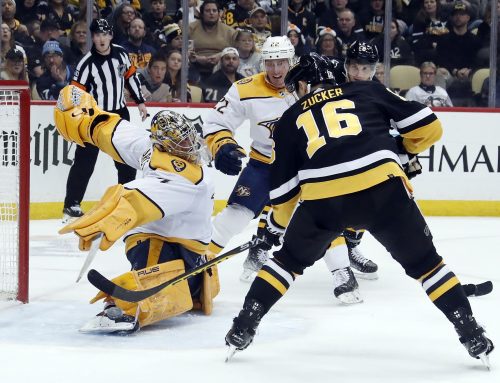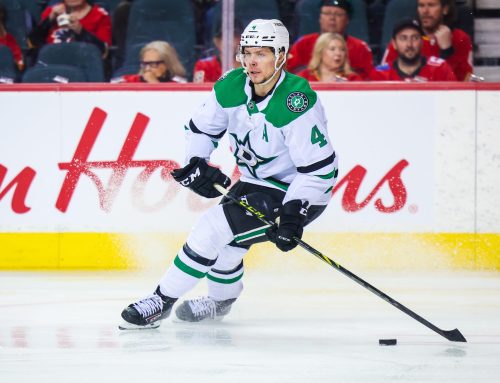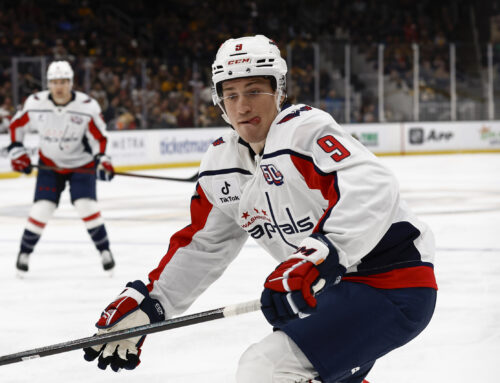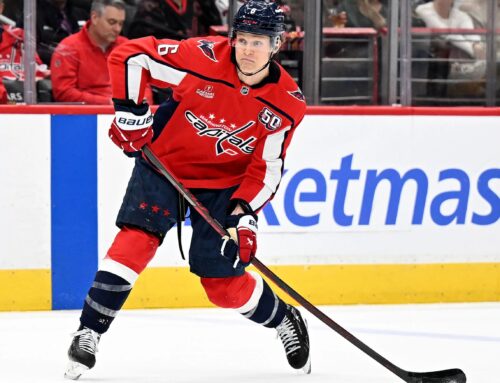Same as the last two weeks, I will review two players that fall into each category. The good will cover players that produced over expectations and provided really good-to-exceptional value to their cap hit. The 'bad' – perhaps better viewed as fair market value, or players that produced on par with salary expectations. The ugly, is just that, players that performed poorly and created an unexpected anchor on your roster.
For those tuning in for the first time in this series or those that don't want to go back to previous articles – the base method I am using for determining a players value is 10-points of production per one million AAV. In multi-cat pools this calculation gets a whole lot muddier as you need to consider many more statistical categories.
A quick review on players I've eliminated from consideration. Your elite-studs – both on expensive contracts (Connor McDavid) and cap-friendly deals (Nathan MacKinnon); entry-level contracts (Jason Robertson); and players that missed the majority of the season due to injury (Tyler Seguin).
Now that we've refreshed the basic ground rules. Here are two players that gave incredible return on their cap hit:
The Good
Sean Couturier – Center – Philadelphia Flyers ($4.33M)
Over the last four seasons Couturier has been one of the best value contracts in the league. A clear tier or two below your superstar bargains, at $4.33M and three seasons of .9 points per game or better he has turned into almost an assured 70-point-per-season, or better, player.
As poor as the Flyers performed as a team, Couturier did not miss a step. With 41 points in 45 games, he again provided a safety net for fantasy owners.
In fact, statistically he seems completely unfazed by the Flyers poor play. Mind you, most of the teams issues were defensive. His shots and hits, power-play points were on par with his previous three seasons. And he again was a top face-off center in the league with a 56.9 percent winning percentage. His shooting percentage was slightly inflated this year at 3.4 percent above his career average. For multi-cat leagues, he provided strong coverage across all your categories.
He is entering the last year of his contract, so enjoy this bargain while you can. Come 2021-22 off-season Couturier is going to get paid. The bargain will be gone. I expect his next deal to be in the $7M-plus range. On the bright side, you have one more year to enjoy this bargain player.
Alex DeBrincat – Left Wing – Chicago Black Hawks ($6.4M)
2019-20 was a down year. It made some ask if expectations on DeBrincat had been set too high. Clearly the were not. While he's not the incredible value as other players I've included over the past couple weeks, an 88-point pace at $6.4M he still provided great value.
A lot of his poor season was due to a porous shooting percentage. At almost half of his career average at 8.7 percent, had he scored based on his career averages his 88-point pace would have been predicted by a lot more experts.
With 32 goals in 52 games, DeBrincat found himself on a 50-goal pace for the first time in his NHL career. Now, he almost assuredly won't shoot 20.6 percent in 2021-22, so expect some regression on that goal total. I suspect we'll see him increase his shots on goal from 3.0 per game to closer to 3.5 per game and off-set that regressed shooting percentage back, closer to career norms.
This off-season, I expect to see a lot of questions around who to own in all formats, Alex DeBrincat or Kyle Connor. I might just have to give the edge to DeBrincat. I can't help but think he has a bit more to give.
Bad (Fair)
Matt Grzelcyk – Defence – Boston Bruins ($3.87M)
There was a ton of debate this past off-season on who would run the Bruins number one power play. Well, a season later, we are only slightly closer to settling this debate. Grzelcyk held the power-play ice-time advantage over Charlie McAvoy at 2:44 to 1:59 and if not for injuries this gap would likely have been slightly larger.
McAvoy seems destined to become the Bruins true number one defenceman, but not their power-play quarterback.
Grzelcyk, on the other hand, did not run away with the job either. There is a dynamic aspect of his game that is missing when you look at how Torey Krug played with that unit.
In his first year having regular first power-play duties he put up respectable numbers. He ended on pace for 44-points and 15 power-play points. These are good numbers but with how dominant the Bruins power-play has been we all expect more from whoever is back there.
With all the rumours of Boston in talks to trade for Oliver Ekman-Larsson and Seth Jones it would seem Boston is not totally convinced Grzelcyk or McAvoy are the long-term answer on the power play either. Also, don't rule out diminutive Jack Ahcan who from all accounts is cut from the same cloth as Krug.
There's still potential for him to improve and become a 50+ point defenceman. This is the type of player I'd look to try and acquire cheaply in the summer and hedge my bets he gets there. With three more years remaining at a cap hit of $3.87M, it wouldn't be a shock to see Grzelcyk move to the first section of this article in a year or two.
Bo Horvat – Center – Vancouver Canucks ($5.5M)
One of those, 'better in real life' players. I remember when Horvat was drafted he was touted as an already mature two-way center and described as a Patrice Bergeron 'lite'. High praises indeed. So far, Horvat is doing his best to meet those expectations.
I really like Horvat as a player in real-life. He comes to play ever night and has really demonstrated the Canucks have made the correct choice in making him the Captain.
Now, when you put your fantasy hat on you find yourself with a player that holds slightly more name value than actual value to your roster. Try trading Horvat for another center with a career high 63-point pace and see what response you get.
If you filter through the Dobber forums you'll find threads throughout the years discussing Horvat's upside being in the 70-point range. You're likely to find a couple posts under my handle making similar ceiling predictions as well.
A lot of owners hold out hopes he becomes another Sean Couturier type of producer. When you watch him play, he will go through a ten or twelve game stretch where he looks every bit a dominant player who can be a 70+ point player. Yet, neither he, nor the Canucks can seemingly put together a consistent season without long droughts.
At 57 points for $5.5M, Horvat delivered exactly on expectations and gave you fair value. He left Horvat owners yearning for that next-level performance for another year. Personally, I'm not ready to rule out a 70-point season yet.
Ryan Pulock – Defence – New York Islanders ($5M)
It was the no goals in his first 41 games for me. I can't say I expected big things from Pulock this year, but I expected a lot more than this. In his first three full seasons he put up ten, nine, and ten goals.
In 2019-20 he found himself on pace for his first 40-point season. I was all buckled in to watch him repeat that and hoped he could build on it slightly. He has been a slow burn, taking a year or two longer than most expected to stick with the Islanders full time.
I'd like to say that after he scored his first goal he turned things around, well, if he turned them around he kept turning until he put himself back on the same underwhelming track. He followed his first goal up with a 10-game pointless streak.
He averaged 5.6 percent shooting over his first three seasons, that plummeted to 1.7 percent. Just that reverting to career norm would leave Pulock with six goals, possibly seven. His secondary assist rate was also 35-50 percent lower than previous seasons which only further hampered his year. Pulock was the victim of a lot of bad luck. He even saw higher offensive zone starts then the previous two years (43.8 percent) to no avail.
His saving grace came in multi-cat leagues. He paced for 180 shots, 150 blocks, 150 hits. That kept him on a lot of rosters, including mine. I found it hard to contemplate even shopping Pulock at any point in the year holding out hope he would flip the switch. Going into 2021-22, that hope hasn't changed or faded.
I expect him to bounce-back next year in a big way. When I say 'in a big way' I'm not expecting a monster year, but I am expecting him to set offensive career-highs into double-digit goals and land in that 45-point range. Pulock is a UFA next year, turning 27 he's going to be motivated to sign the fist long term contract of his career. I don't really see the flat cap affecting Pulock's decision very much. Entering unrestricted free agency in 2021-22 he'll be looking to sign the fist long term deal of his career. The flat cap won't really affect his salary very much. If we look at a Justin Faulk, I think we can get a pretty good idea as to where the ceiling of Pulock's next contract sits.
Matt Duchene – Center – Nashville Predators ($8M)
I know I covered Ryan Johansen last week, yet I couldn't turn around and just ignore the horrific season Duchene had along side him. Now just imagine both of these centers produced close to career averages! The Predators would have been a completely different team. The fact they made the playoffs in spite of these two says something about the character of this team and the goaltending performance of Juuse Saros in the second half of the season.
Duchene holds a career .73 point per game average, or 60-points per year. His .38 point per game, 31-point pace is by far the worst of his career. He has also seen his shots per game dip to the lowest levels of his career, at 2.1 in each of his two seasons in Nashville. We've also witnessed his shooting percentage drop from a career average of 12.5 percent to 9.6 percent in 2019-20 and then 8.2 percent in 2020-21. He also saw a two minute per game dip in ice time in 2019-20 and dip another minute to 15:50 this year (Averaged 18:50 per game between Ottawa and Columbus).
All that said, as a 60-point producer at $8M per season its unlikely he ever produces a fantasy season that fully justifies spending this much cap space on him. This speaks true for both points-only pools an multi-cat pools. If your pool counts face-offs then he has some redeeming quality beyond points. Well, he did until John Hynes moved him to the wing.
It strikes me as odd that at, 53.8 percent on faceoffs for his career, and over 55 percent in four of the last six seasons, that Hynes would move him to the wing. He has all the markings of a player that just does not fit within the teams system. If one of Johansen or Duchene were to be moved this off-season my money would be on Duchene.
This isn't a player that I would be rushing out to acquire no matter how much I expect him to bounce back next year.
Thanks for reading.
(all stats from frozentools.com; all cap info from capfriendly.com)
Give me a follow on twitter @doylelb





 SEA
SEA CHI
CHI OTT
OTT EDM
EDM DAL
DAL STL
STL L.A
L.A ANA
ANA FLA
FLA CBJ
CBJ BUF
BUF
